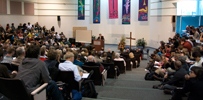Douglas Moo: Recontextualizing Romans

Douglas Moo is the Kenneth T. Wessner Professor of New Testament at Wheaton College. He will teaching The Epistle to the Romans in Context at Regent College from May 23–June 3. We spoke with Dr. Moo about his longstanding enthusiasm for Romans and the importance of good interpretation.
We’re looking forward to having you here at Regent College in a few weeks. I understand that you’ll be teaching The Epistle to the Romans in Context. What it is that inspires you to keep teaching on the book of Romans?
I’ve been studying Romans pretty seriously for 25 years now. One of the things I’ve realized in teaching it to many people in many parts of the world is that Romans is absolutely foundational for a Christian worldview. It provides significant insight into who God is, what he’s doing, and how we are to rightly understand our place in the world with respect to him. Teaching Romans and the issues it raises is a great way to help Christians think very fundamentally about who they are and about their context and their world.
Your course is titled The Epistle to the Romans in Context. How does a broad understanding of context impact the interpretation of Romans?
Well, “context” in this case has a double sense. In the first place, we’ll consider the context of Romans itself. There is a longstanding tendency in the history of the church to view Romans as a sort of timeless theological treatise. Well, it is deeply theological, of course, but it was also written at a certain point in time to address certain concerns in the church. Before reading Romans and applying it, we need to understand those concerns and that context.
Secondly, we’ll consider our current context. In order to apply Romans faithfully, we have to recontextualize it for ourselves: we have to make that transition from Romans in the 1st and 2nd century world to the way that it should be understood in the 21st century world. As the course unfolds, I hope to bridge those two contexts.
As you noted, you’ve studied Romans for many years. As time has unfolded and your study has matured, has your understanding of the book changed?
Yes. My initial study of Romans certainly illuminated a lot of things for me. Since that initial study, and as I’ve continued to work on the letter over the years, I’ve continued to deepen and nuance my understanding of its message. I wouldn’t say that there have been any revolutionary changes in the way I view the letter or its basic teaching, but I am constantly running up against new ideas that need to be assessed in light of Romans. That’s what I find particularly interesting and exciting: not changes in my own theology but in how it addresses and applies to new ideas and issues in our time.
Can you provide some examples?
There are so many, but two in particular come to mind. First, there is a great concern among contemporary Christians to find new ways of developing community and stress the importance of the corporate nature of the church. This is a great emphasis and a much-needed one. However, I do find that it gets taken to extreme in some circles, to the neglect of the individual. The gospel as set out in Romans absolutely confronts every individual with choices that need to be made. On the other hand, those individuals are never divorced from their social and cultural contexts. They are individuals, but when they respond to the gospel they are brought into the corporate body of the church. We have to be careful to pay attention to that balance.
A second issue that comes to mind is the recent interest in rethinking the significance of the gospel: the idea that for Paul, particularly in Romans, the gospel is not simply about personal salvation but encompasses Christ’s lordship over all creation. And again, I find myself trying to steer a careful course between recognizing that the gospel does in fact focus on the offer of salvation to human beings, while acknowledging that it also extends beyond human salvation to include the celebration of good news with implications for a lot of other issues. It’s not about the gospel or social action, or the gospel or environmental concern: these issues and others like them are part of the gospel.
You’ve commented elsewhere that your work is inspired by a particular piece of advice: “apply yourself wholly to the text; apply the text wholly to yourself.” What have been some of the challenges you’ve encountered in your doctrine and your personal faith as you’ve applied yourself to Romans, and applied Romans to yourself?
That’s a good question.
One of the things that Romans has certainly challenged is the way that we need to understand our relationships to each other and to the church. One key text in Romans for me is the bit in chapters 14–15 that comments on the weak and the strong and how that translates into my response to people in the church with whom I disagree. That’s been something that’s challenged me on many levels. It has challenged me theologically, forcing me to think carefully and consider what views I should tolerate in the Christian church among my brothers and sisters. But it has also challenged me practically as I’ve considered how that works out in terms of my relationships with those of my brothers and sisters with whom I disagree on some points.
What are you hoping that your students will take away from this class?
I want my students to have a better sense of the Christian worldview that flows out of the gospel and undergirds life and ministry. Ultimately, though, I hope that they find a deeper love for God. That’s always my concern: that students leave after studying the word with a deeper love for Christ.
Want to learn more? Sign up for The Epistle to the Romans in Context with Dr. Moo or view our full selection of summer courses here.
Meet more of this summer's fantastic instructors! Read our interviews with J.I. Packer and Gordon T. Smith.




